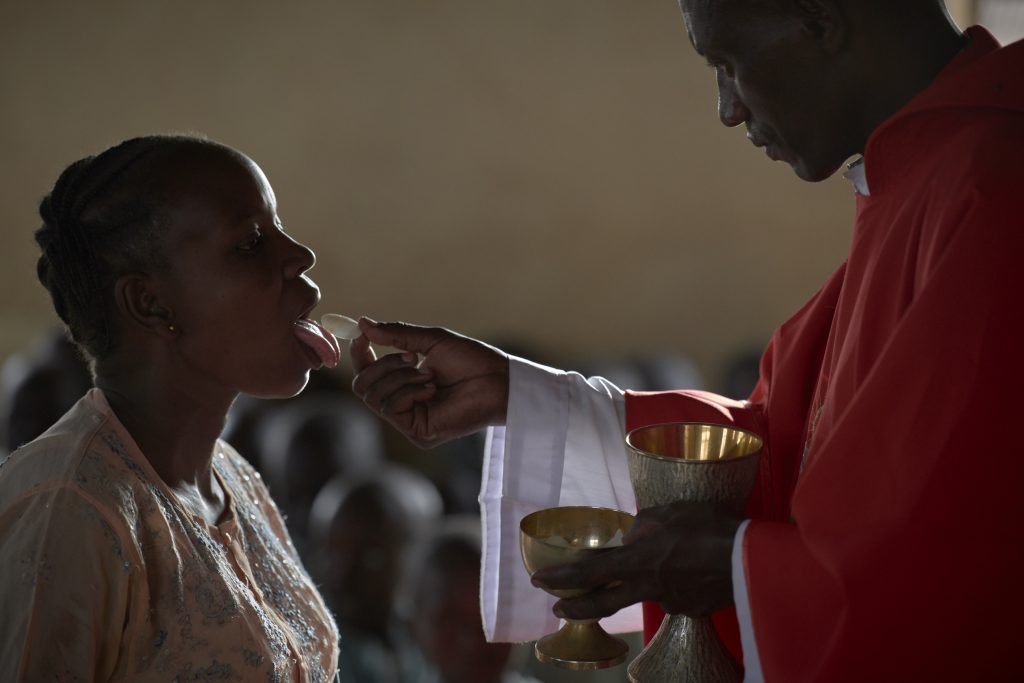Back in the mid-90s, a newly minted Catholic convert, I often attended daily noon Mass at St. Basil’s in Koreatown. I found it thrilling — I still do — that the Mass on any given day was the same everywhere, subject neither to the whim of the priest, the sensibilities of the worshippers, or the free-spirit caprice of, say, a parish council.
Beforehand, an older lady led us in the Angelus, followed by the Morning Offering that begins: “Oh Jesus, through the Immaculate Heart of Mary, I offer you my prayers, works, joys, and sufferings of this day, in union with the holy sacrifice of the Mass throughout the world.”
I’ve thought of that prayer a lot lately. On one end of the spectrum is the “Mass” I recently attended that featured a large likeness of the Buddha, “hymns” by Leonard Cohen, and the Gospel read by a woman.
The Trinitarian God, maker of all things visible and invisible, already includes everybody and everything. To purport to be more inclusive than Christ by individualizing the Mass only de-sacramentizes the Eucharist.
On the other end of the spectrum is the crowd who wants to return the Mass to pre-Vatican II times and finds a non-Latin Mass subpar.
I understand the hunger for beautiful liturgy and music around the Eucharist. But the fact is, as Flannery O’Connor once observed, “Mass could be said out of a suitcase in a furnace room, and the same sacrifice would take place.”
The real beauty of the Mass comes from the disposition of the heart we bring to the altar of the “one, holy, catholic, and apostolic Church” to which we pledge obedience in the Creed.
On a recent trip to Ireland, the first place I visited, after checking into my Dublin Airbnb, was a church: St. Francis Xavier, better known to locals as the Gardiner Street Church, where Ven. Matt Talbot was a parishioner for 40 years.
The leather covering the kneelers was cracked, the paint near the ceiling was peeling. And down near the front was a gent in a shabby sports coat, along with two frail old ladies, and a young mother with a baby praying the rosary.
Instantly I was oriented. Instantly I was home. I knelt, picked up the thread, and entered into the heart of the city, the island, the world.
“Look at the people at, say, a daily Monday morning Mass,” a friend remarked recently. “Do they look like they’re trying to ‘reform’ the liturgy? Do they seem at the top of their game? No. They’re clinging on. They’re barely clinging on.”
That’s the attitude with which to approach Mass. The Spanish philosopher Miguel de Unamuno wrote that the most holy thing about a church is that it’s a place where people go to weep.
People throughout history have died in order to receive the Eucharist. Servant of God Walter Ciszek, a Polish-American Jesuit priest sentenced to hard labor in Siberia, served clandestine Masses in the woods at noon for his men, all of them under penalty of torture or death. Already under starvation rations, they would fast from midnight the night before in order to receive the Eucharist, so much did it mean to them.
People throughout the world today are putting their lives in peril every time they attend Mass. The Santa Ana-based World Watch list reports that 1 in 7 believers worldwide are persecuted: in Afghanistan, North Korea, Somalia, Libya, and a host of other countries.
We need the Eucharist to hold together. We need the whole Mystical Body. We need to be in union with every other Mass throughout the world because we can’t make it through this vale of tears alone. We want to offer ourselves up in solidarity with the prayers, works, joys, and sufferings of every other person in the world because that offering is the only possible point and meaning of our existence.
The British spiritual writer Caryll Houselander once observed: “It was during the London blitz [in World War II] that the glory of the ceaseless elevation of the Host came home to me as never before. It was often difficult then to go to Mass, or to be able to receive Communion… Now more than a year after the end of the war I still experience a sense of relief like a load falling from the heart every time I go to Mass, and over and over again on the way. I think of those others who still have, and may always have, dangers and hardships to face in order to go to Mass — of martyrs and potential martyrs in persecuted countries, of missionaries who endure any privation, any risk, to take Christ to the ends of the earth to be adored, to give him, as the bread of life, to any little spiritual starveling in pagan land.”
That we should be counted worthy to receive the Eucharist — in any setting, under any circumstances — even once in our lives would be the summit of our existence. That’s something to remember each time we attend Mass.

